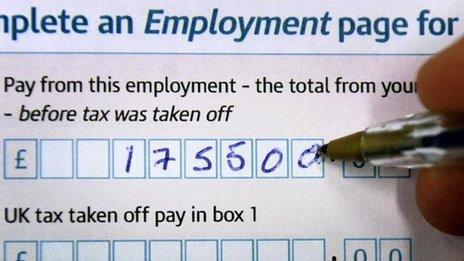Autumn Statement: Bid to recoup £9bn in unpaid tax
- Published

Tackling tax avoidance has been a common theme from the government
A major package of measures to cut tax avoidance, evasion and tax planning has been announced by Chancellor George Osborne.
Together, these changes are expected to increase government receipts by £9bn over the next five years, the Autumn Statement documents show.
So what are the key anti-avoidance features, which could affect a large number of people?
Working via an agency
The chancellor has announced changes to prevent "employment intermediaries being used to avoid employment taxes and obligations by disguising employment as self-employment".
Although this sounds like an attack on personal service companies, the BBC understands that this is not the government's intention - the changes are instead to be focused on agencies.
If you work through an agency you are treated as self-employed if you meet certain specific tests. One of these tests is the right to send someone else to do the job instead of you - known as the right of substitution.
If there is a right of substitution, the company you work for does not have to pay employer National Insurance, saving 13.8% on all wages over a low threshold.
Some agencies - employment intermediaries - have been using contracts which include a clause giving the individual a right of substitution, even though there is, in reality, no such right.
The new rules are expected to target the use of such contrived contracts, and the changes are expected to net around £500m a year.
Avoidance schemes
If you have used a marketed avoidance scheme which HM Revenue and Custom (HMRC) believes to be ineffective, they will challenge the scheme in the courts.
Usually one or two cases are selected as test cases and take several years to go through the courts. The rest - called "followers" by HMRC - sit and wait to see what happens. During this time, followers normally retain the benefit of the tax saving, and HMRC have to recover the money later if they win in the courts.
New rules are expected to make two changes. Firstly, if the scheme is defeated at any stage in the courts, followers will be asked to concede their case. If they do not, because they hope the test case will succeed on appeal, they will be charged a penalty if the test case is eventually lost on the same point of law.
Secondly, once HMRC have won in the courts, the followers who do not concede will have to pay over the tax which has been avoided, even though the test case itself appeals to a higher court.
The government will also consult on whether to tighten these rules further, to prevent those using tax avoidance arrangements gaining a cash-flow advantage while it is under challenge.
Charity schemes
New rules will prevent a charity from being entitled to claim charity tax reliefs, such as Gift Aid, if tax avoidance is one of the main purposes of establishing the charity.
The definition of a charity for tax purposes will also be amended to exclude such charities. These changes are likely to be a response to arrangements such as those set up by the "Cup Trust", in which £46m of Gift Aid was claimed by the trust, but the charity only received benefits of £155,000.
Partnerships
In recent years there has been a surge in the number of planning arrangements under which a company becomes a member of a partnership. The new legislation is expected to clamp down on these schemes.
Where the arrangements reduce tax rates for the other partners, the rules take effect from 5 December, 2013; in other cases they will take effect from 6 April, 2014.
Overall, this Autumn Statement underlines the overall message of previous Budgets - that the government wants to narrow the loopholes and tighten the net on tax avoidance.